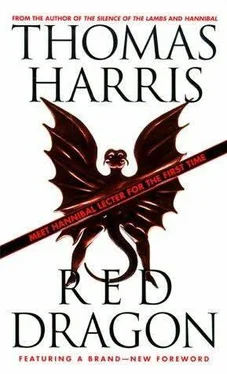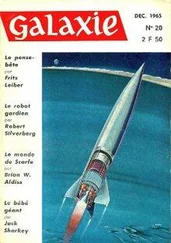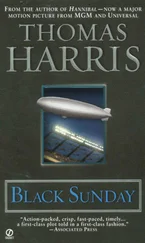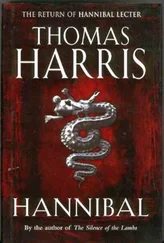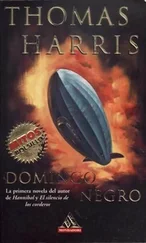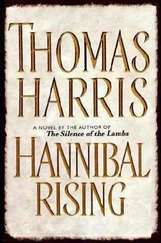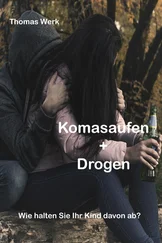She heard the knob rattle.
"That's good. Now go in the bedroom, you know the way." She stumbled and went down on her knees, her head bowed. He lifted her by the arms and supported her into the bedroom.
"Sit in this chair." She sat.
"GIVE HER TO ME NOW."
She struggled to rise; big hands on her shoulders held her down.
"Sit still or I can't keep Him off you," Dolarhyde said. Her mind was coming back. It didn't want to.
"Please try," she said.
"Reba, it's all over for me."
He was up, doing something. The odor of gasoline was very strong.
"Put out your hand. Feel this. Don't grab it, feel it."
She felt something like steel nostrils, slick inside. The muzzle of a gun.
"That's a shotgun, Reba. A twelve-gauge magnum. Do you know what it will do?"
She nodded.
"Take your hand down." The cold muzzle rested in the hollow of her throat.
"Reba, I wish I could have trusted you. I wanted to trust you." He sounded like he was crying.
"You felt so good."
He was crying.
"So did you, D. I love it. Please don't hurt me now."
"It's all over for me. I can't leave you to Him. You know what He'll do?"
Bawling now.
"Do you know what He'll do? He'll bite you to death. Better you go with me."
She heard a match struck, smelled sulfur, heard a whoosh. Heat in the room. Smoke. Fire. The thing she feared most in the world. Fire. Anything was better than that. She hoped the first shot killed her. She tensed her legs to run.
Blubbering.
"Oh, Reba, I can't stand to watch you burn."
The muzzle left her throat.
Both barrels of the shotgun went off at once as she came to her feet.
Ears numbed, she thought she was shot, thought she was dead, felt the heavy thump on the floor more than she heard it.
Smoke now and the crackle of flames. Fire. Fire brought her to herself. She felt heat on her arms and face. Out. She stepped on legs, stumbled choking into the foot of the bed.
Stoop low, they said, under the smoke. Don't run, you'll bump into things and die.
She was locked in. Locked in. Walking, stooping low, fingers trailing on the floor, she found legs – other end – she found hair, a hairy flap, put her hand in something soft below the hair. Only pulp, sharp bone splinters and a loose eye in it.
Key around his neck… hurry. Both hands on the chain, legs under her, snatch. The chain broke and she fell backward, scrambling up again. Turned around, confused. Trying to feel, trying to listen with her numbed ears over the crackle of the flames. Side of the bed… which side? She stumbled on the body, tried to listen.
BONG, BONG, the clock striking. BONG, BONG, into the living room, BONG, BONG, take a right.
Throat seared with smoke. BONG BONG. Door here. Under the knob. Don't drop it. Click the lock. Snatch it open. Air. Down the ramp. Air. Collapsed in the grass. Up again on hands and knees, crawling.
She came up on her knees to clap, picked up the house echo and crawled away from it, breathing deep until she could stand, walk, run until she hit something, run again.
Locating Francis Dolarhyde’s house was not so easy. The address listed at Gateway was a post-office box in St. Charles.
Even the St. Charles sheriff's department had to check a service map at the power-company office to be sure.
The sheriff's department welcomed St. Louis SWAT to the other side of the river, and the caravan moved quietly up State Highway 94. A deputy beside Graham in the lead car showed the way. Crawford leaned between them from the back seat and sucked at something in his teeth. They met light traffic at the north end of St. Charles, a pickup full of children, a Greyhound bus, a tow truck.
They saw the glow as they cleared the northern city limits.
"That's it!" the deputy said. "That's where it is!"
Graham put his foot down. The glow brightened and swelled as they roared up the highway.
Crawford snapped his fingers for the microphone.
"All units, that's his house burning. Watch it now. He may be coming out. Sheriff, let us have a roadblock here, if you will."
A thick column of sparks and smoke leaned southeast over the fields, hanging over them now.
"Here," the deputy said, "turn in on this gravel."
They saw the woman then, silhouetted black against the fire, saw her as she heard them and raised her arms to them.
And then the great fire blasted upward, outward, burning beams and window frames describing slow high arcs into the night sky, the blazing van rocked over on its side, orange tracery of the burning trees suddenly blown out and dark. The ground shuddered as the explosion whump rocked the police cars.
The woman was face down in the road. Crawford and Graham and the deputies out, running to her as fire rained in the road, some running past her with their weapons drawn.
Crawford took Reba from a deputy batting sparks from her hair.
He held her arms, face close to hers, red in the firelight.
"Francis Dolarhyde," he said. He shook her gently. "Francis Dolarhyde, where is he?"
"He's in there," she said, raising her stained hand toward the heat, letting it fall. "He's dead in there."
"You know that?" Crawford peered into her sightless eyes.
"I was with him."
"Tell me, please."
"He shot himself in the face. I put my hand in it. He set fire to the house. He shot himself. I put my hand in it. He was on the floor. I put my hand in it can I sit down?"
"Yes," Crawford said. He got into the back of a police car with her. He put his arms around her and let her cry into his jowl.
Graham stood in the road and watched the flames until his face was red and sore.
The winds aloft whipped smoke across the moon.
The wind in the morning was warm and wet. It blew wisps of cloud over the blackened chimneys where Dolarhyde's house had stood. Thin smoke blew flat across the fields.
A few raindrops struck coals and exploded in tiny puffs of steam and ashes.
A fire truck stood by, its light revolving.
S. F. Aynesworth, FBI section chief, Explosives, stood with Graham upwind of the ruins, pouring coffee from a thermos.
Aynesworth winced as the local fire marshal reached into the ashes with a rake.
"Thank God it's still too hot for him in there," he said out of the side of his mouth. He had been carefully cordial to the local authorities. To Graham, he spoke his mind. "I got to wade it, hell. This place'll look like a fucking turkey farm soon as all the special deputies and constables finish their pancakes and take a crap. They'll be right on down to help."
Until Aynesworth's beloved bomb van arrived from Washington, he had to make do with what he could bring on the plane. He pulled a faded Marine Corps duffel bag out of the trunk of a patrol car and unpacked his Nomex underwear and asbestos boots and coveralls.
"What did it look like when it went up, Will?"
"A flash of intense light that died down. Then it looked darker at the base. A lot of stuff was going up, window frames, flat pieces of the roof, and chunks flying sideways, tumbling in the fields. There was a shock wave, and the wind after. It blew out and sucked back in again. It looked like it almost blew the fire out."
"The fire was going good when it blew?"
"Yeah, it was through the roof and out the windows upstairs and down. The trees were burning."
Aynesworth recruited two local firemen to stand by with a hose, and a third dressed in asbestos stood by with a winch line in case something fell on him.
He cleared the basement steps, now open to the sky, and went down into the tangle of black timbers. He could stay only a few minutes at a time. He made eight trips.
All he got for his effort was one flat piece of torn metal, but it seemed to make him happy.
Читать дальше
